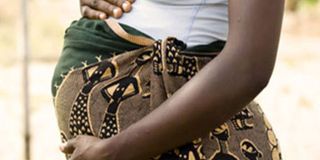Bundibugyo records 2,000 teen pregnancies in six months

What you need to know:
- Ms Joy Tumusime, a health worker at Bukangama Health Centre III in Bukonzo Sub-county, said young pregnant girls receive special care at the facility to ensure safe delivery.
- Mr Franklin Muhindo, the executive director of Inclusion and Humanity Hand to Hand Initiative an NGO, called for collaboration to end defilement.
Health facilities in Bundibugyo District have continued to register a surge in the number of teenage girls seeking antenatal care services, with authorities attributing it to defilement.
The district probation officer, Ms Pamela Adongo, last week said between January and July this year, a total of 2,194 girls have sought antenatal care services from different facilities.
She said the number is likely to be more because many girls fear going to health facilities but instead deliver under the hands of traditional birth attendants.
“It’s time we fight defilement. In the previous year, we registered 3,000 teenage pregnancies which means our girls are getting married at a young age,” Ms Adongo said. She accused parents of neglecting their responsibilities, leaving their girls at risk of being defiled. Ms Adongo added that several cases of defilement have been settled domestically.
Bishop Barnabas Tibaijuka of West Ruwenzori Diocese, said the situation had affected girls’ educational prospects.
“These vices have negative social and economic effects on our society. I urge stakeholders to unite and fight against child abuse,” he said.
Mr Moses Bagambe, the Ngamba Sub-county councillor, called for the sensitisation of teenagers, especially girls, on protective measures against unwanted pregnancies.
“We shouldn’t preach only about abstinence but also emphasise protection measures for those who cannot abstain. We have also realised that there is a high rate of teenage pregnancies in rural areas compared to urban centres,” Mr Bagambe said.
Ms Joy Tumusime, a health worker at Bukangama Health Centre III in Bukonzo Sub-county, said young pregnant girls receive special care at the facility to ensure safe delivery.
Mr Franklin Muhindo, the executive director of Inclusion and Humanity Hand to Hand Initiative an NGO, called for collaboration to end defilement.
“There is a need for collaboration to make by-laws and enforce the implementation of existing policies, laws, and approaches to end this vice,” Mr Muhindo said.
“We still have societal intolerance with some of our parents who marry off their children due to high levels of poverty but also poor traditional practices,” he added.
The district vice chairperson, Mr Joel Bwambale, called for the establishment of the District Action Centre to fight child abuse and ensure that perpetrators are prosecuted.
“This committee will work with our partner organisations to address issues affecting children and take action against the perpetrators,” Mr Bwambale said.
Risks of teenage pregnacies
The 2022 Uganda Demographic and Health Survey highlights that one in four (24 percent) girls aged 15-19 years are either mothers or pregnant with their first child.
Health complications: Teenage pregnancy exposes girls to several health hazards that result in issues during pregnancy and delivery endangering both the mother and the child. For instance, they face higher risks of developing delivery-related complications such as fistula and other systemic infections. Such girls are at an increased risk of death because of these complications, with teenage pregnancy contributing 28 percent to maternal deaths according to a 2021 Unicef study.
Stigma: Teenage mothers often face stigma and rejection from their communities. Teen mothers are also more often likely to drop out of school, affecting their employment and livelihood prospects and widening the gap between girls’ and boys’ education attainment. It also exposes individuals to domestic violence and makes access to reproductive health services difficult.




